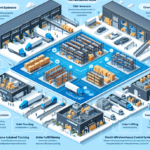Infor CloudSuite WMS vs Oracle Warehouse Management Cloud (WMS)
When it comes to warehouse management systems (WMS), Infor CloudSuite WMS and Oracle Warehouse Management Cloud (WMS) are two of the most prominent solutions available in the market. Both platforms offer a wide range of functionalities designed to streamline warehouse operations, optimize inventory levels, and boost productivity. However, there are critical differences between them that can influence the decision of potential buyers. This article provides a comprehensive comparison of Infor CloudSuite WMS and Oracle Warehouse Management Cloud (WMS) to help determine which solution best suits your business needs.
Overview of Infor CloudSuite WMS and Oracle Warehouse Management Cloud (WMS)
Infor CloudSuite WMS and Oracle Warehouse Management Cloud (WMS) are both robust solutions aimed at enhancing warehouse efficiency. While they share many core functionalities, their approaches to customization, support, and integration differ significantly.
Key Features and Functionalities
Infor CloudSuite WMS
Infor CloudSuite WMS offers a suite of features designed for efficient warehouse management, including:
- Real-Time Inventory Management: Monitor inventory levels and movements in real-time, reducing discrepancies and improving accuracy.
- Advanced Picking Options: Features like cross-docking, wave picking, and batch picking optimize the picking process.
- RFID and Barcode Integration: Supports radio-frequency identification (RFID) and barcode scanning for seamless data capture.
- Mobile Device Support: Enables warehouse workers to access data on-the-go, minimizing manual data entry.
- ERP and CRM Integration: Integrates with other business systems to provide a comprehensive view of the supply chain.
- Customizable Dashboards and Reports: Offers insights into key performance indicators (KPIs) to identify areas for improvement.
According to a Gartner report, Infor CloudSuite WMS is recognized for its flexibility and user-friendly interface, making it a strong contender in the WMS market.
Oracle Warehouse Management Cloud (WMS)
Oracle Warehouse Management Cloud (WMS) provides advanced functionalities aimed at optimizing warehouse operations, including:
- Optimized Task Management: Efficiently manages tasks to enhance productivity.
- Dynamic Slotting: Adjusts slotting in real-time based on demand and inventory levels.
- Predictive Analytics and Machine Learning: Utilizes data-driven insights to forecast inventory needs and optimize picking.
- End-to-End Integration: Seamlessly integrates with other Oracle products for streamlined operations.
- Complex Supply Chain Management: Capable of managing multiple warehouses, distribution centers, and third-party logistics providers.
- Cross-Docking and Order Consolidation: Optimizes transportation and reduces costs through efficient order handling.
A Forrester report highlights Oracle WMS's strong capabilities in handling complex supply chain scenarios, making it suitable for large enterprises with intricate logistics needs.
Pros and Cons
Infor CloudSuite WMS
Pros:
- Highly customizable to fit specific business needs.
- Extensive training resources and customer support.
- Seamless integration with other Infor products.
- Advanced analytics and reporting capabilities.
Cons:
- Complex pricing model with additional costs for add-ons.
- Implementation can be time-consuming.
- Reliance on internet connectivity may affect performance during outages.
Oracle Warehouse Management Cloud (WMS)
Pros:
- Advanced functionalities like predictive analytics and machine learning.
- Highly scalable, suitable for large enterprises.
- End-to-end integration with other Oracle cloud solutions.
- Real-time inventory tracking and monitoring.
Cons:
- Complex setup process requiring significant resources.
- Higher cost compared to some other WMS solutions.
- May require specialized expertise to fully utilize.
Pricing Models
Infor CloudSuite WMS offers a flexible pricing model tailored to business-specific needs. Pricing typically includes a base fee with additional charges for add-ons and enhancements, such as extra users or modules. This model allows businesses to scale their investment based on their growth and requirements.
Oracle Warehouse Management Cloud (WMS) operates on a subscription-based pricing model, priced according to the number of users and modules required. Oracle also offers on-premises deployment options for businesses with specific needs, although this may come at a higher cost.
It's important to consider not only the initial investment but also the total cost of ownership, including implementation, training, and ongoing support. According to a Nucleus Research study, businesses should evaluate the long-term benefits and ROI when selecting a WMS solution.
Deployment Options: On-Premises vs Cloud-Based
Infor CloudSuite WMS provides both on-premises and cloud-based deployment options. On-premises deployment offers greater control over data and system customization but requires significant investment in hardware and IT resources. Conversely, the cloud-based option reduces the need for physical infrastructure, offering scalability and easier maintenance.
Oracle Warehouse Management Cloud (WMS) primarily offers a cloud-based deployment model, providing businesses with enhanced flexibility, scalability, and cost savings. Cloud deployment also facilitates easier access from multiple locations and supports remote work environments.
A study by Gartner predicts that by 2030, 75% of all critical business applications will be hosted on the cloud, underscoring the growing preference for cloud-based WMS solutions.
Integration Capabilities
Integration capabilities are vital for a seamless warehouse management experience. Infor CloudSuite WMS is built on an open architecture, facilitating integration with various systems such as ERP, MRP, and shipping software. This flexibility allows businesses to create a unified system that enhances operational efficiency.
Oracle Warehouse Management Cloud (WMS) offers comprehensive integration with other Oracle products, including Transportation Management Cloud and Global Trade Management Cloud, providing end-to-end supply chain visibility. However, integrating with non-Oracle systems may present challenges and require additional customization.
According to Forbes, effective system integration is crucial for real-time data visibility and streamlined operations.
User Interface Comparison
The user interface (UI) plays a significant role in the ease of use and adoption of a WMS. Infor CloudSuite WMS is designed to be intuitive and user-friendly, with a streamlined interface that minimizes the learning curve for warehouse staff.
Oracle Warehouse Management Cloud (WMS) offers a highly customizable interface, allowing businesses to tailor the UI to their specific workflows and preferences. While this flexibility can enhance user experience, it may also overwhelm users who are not adequately trained.
Research from Nielsen Norman Group emphasizes the importance of a user-friendly interface in reducing training time and increasing productivity.
Security Features
Security is paramount in warehouse management to protect sensitive business data. Infor CloudSuite WMS offers robust security features, including secure data storage, regular backups, and compliance with industry standards such as GDPR and ISO 27001.
Oracle Warehouse Management Cloud (WMS) also provides comprehensive security measures, including data encryption, user access controls, and regular security audits. Oracle's extensive security protocols help safeguard data against unauthorized access and cyber threats.
A report by Cybersecurity Insiders highlights the critical security measures that WMS solutions should implement to protect against data breaches and ensure regulatory compliance.
Customer Support Comparison
Reliable customer support is essential for the successful implementation and ongoing use of a WMS. Infor CloudSuite WMS provides businesses with dedicated customer support representatives available 24/7 through various channels, including phone, email, and live chat. Additionally, Infor offers extensive online resources such as tutorials, user forums, and knowledge bases.
Oracle Warehouse Management Cloud (WMS) similarly offers robust customer support, including dedicated account managers, a comprehensive knowledge base, and multiple support channels. Oracle also provides training programs and resources to help users maximize the platform's capabilities.
An analysis by Helpdesk.com suggests that effective customer support significantly enhances user satisfaction and system adoption rates.
Case Studies
Here are some companies that have successfully implemented Infor CloudSuite WMS or Oracle Warehouse Management Cloud (WMS) and achieved significant improvements:
- ChemPoint: Implemented Infor CloudSuite WMS and experienced a notable increase in warehouse efficiency, enhanced inventory management, and a reduction in manual data entry errors.
- FLS Transportation: Adopted Oracle Warehouse Management Cloud (WMS), resulting in a significant decrease in inventory carrying costs and improved accuracy in order picking.
Final Verdict: Which One is the Best Option for Your Business?
Choosing between Infor CloudSuite WMS and Oracle Warehouse Management Cloud (WMS) depends on your specific business requirements, including the size of your operation, the complexity of your warehouse processes, and your budget.
Infor CloudSuite WMS is ideal for businesses seeking a highly customizable and user-friendly solution with comprehensive support and integration capabilities. Its flexibility makes it suitable for a wide range of industries and warehouse sizes.
Oracle Warehouse Management Cloud (WMS), on the other hand, is well-suited for large enterprises with complex supply chain needs. Its advanced functionalities, scalability, and robust integration with other Oracle products make it a powerful tool for optimizing large-scale warehouse operations.
Ultimately, conducting a thorough analysis of both solutions, considering your business requirements, and possibly leveraging trial periods or consultations can help you make an informed decision that best aligns with your warehouse management goals.






















